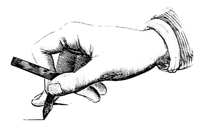Town Ball, Georgia (1830s): Difference between revisions
(Created page with "{{Rule Sets Box}} from ''The Farm and the Fireside: Sketches of Domestic Life in War and Peace'' by “Bill Arp,"; Constitution Publishing Company, 1892; pp 267-268. Bill Arp...") |
No edit summary |
||
| Line 1: | Line 1: | ||
{{Rule Sets Box}} | {{Rule Sets Box}} | ||
from ''The Farm and the Fireside: Sketches of Domestic Life in War and Peace'' by “Bill Arp," | from ''The Farm and the Fireside: Sketches of Domestic Life in War and Peace'' by “Bill Arp," Constitution Publishing Company (1892) pp 267-268. Bill Arp was the ''nom de plume'' of Charles Henry Smith, a Georgia politician who was born in 1826. He’s talking about his school days in Lawrenceville, Georgia in what must have been the 1830s. | ||
----------------------------- | ----------------------------- | ||
What glorious sport in playing town-ball and bull-pen and cat and rolly-hole and knucks and sweep-stakes. Base-ball has grown out of town-ball; it is no improvement. The pitcher used to belong to the ins and threw the best ball he could, for he wanted it hit, and knocked as far away as possible, but now he belongs to the outs and wants it missed. We used to throw at a boy to stop him running to another base, and we hit him if we could, but these modern balls are hard and heavy and dangerous, and many a boy goes home with a bruised face or a broken finger. We used to take an old rubber shoe and cut it into strings and wind it tight into a ball until it was half grown, and then finish it with yarn that was unraveled from an old woolen sock. Our good mothers furnished everything and then made a buckskin cover and stitched it over so nice. Oh, my, how those balls would bounce, and yet they didn’t hurt very bad when hit by them. They were sweet to throw and sweet to catch…When we played town-ball some of the outs would circle away off 200 yards, and it was glorious to see them catch a ball that had nearly reached the sky as it gracefully curved from the stroke of the bat. We had an hour and a half for recess, and most of it was spent in town-ball or bull-pen. | What glorious sport in playing town-ball and bull-pen and cat and rolly-hole and knucks and sweep-stakes. Base-ball has grown out of town-ball; it is no improvement. The pitcher used to belong to the ins and threw the best ball he could, for he wanted it hit, and knocked as far away as possible, but now he belongs to the outs and wants it missed. We used to throw at a boy to stop him running to another base, and we hit him if we could, but these modern balls are hard and heavy and dangerous, and many a boy goes home with a bruised face or a broken finger. We used to take an old rubber shoe and cut it into strings and wind it tight into a ball until it was half grown, and then finish it with yarn that was unraveled from an old woolen sock. Our good mothers furnished everything and then made a buckskin cover and stitched it over so nice. Oh, my, how those balls would bounce, and yet they didn’t hurt very bad when hit by them. They were sweet to throw and sweet to catch…When we played town-ball some of the outs would circle away off 200 yards, and it was glorious to see them catch a ball that had nearly reached the sky as it gracefully curved from the stroke of the bat. We had an hour and a half for recess, and most of it was spent in town-ball or bull-pen. | ||
Latest revision as of 10:16, 13 March 2016
from The Farm and the Fireside: Sketches of Domestic Life in War and Peace by “Bill Arp," Constitution Publishing Company (1892) pp 267-268. Bill Arp was the nom de plume of Charles Henry Smith, a Georgia politician who was born in 1826. He’s talking about his school days in Lawrenceville, Georgia in what must have been the 1830s.
What glorious sport in playing town-ball and bull-pen and cat and rolly-hole and knucks and sweep-stakes. Base-ball has grown out of town-ball; it is no improvement. The pitcher used to belong to the ins and threw the best ball he could, for he wanted it hit, and knocked as far away as possible, but now he belongs to the outs and wants it missed. We used to throw at a boy to stop him running to another base, and we hit him if we could, but these modern balls are hard and heavy and dangerous, and many a boy goes home with a bruised face or a broken finger. We used to take an old rubber shoe and cut it into strings and wind it tight into a ball until it was half grown, and then finish it with yarn that was unraveled from an old woolen sock. Our good mothers furnished everything and then made a buckskin cover and stitched it over so nice. Oh, my, how those balls would bounce, and yet they didn’t hurt very bad when hit by them. They were sweet to throw and sweet to catch…When we played town-ball some of the outs would circle away off 200 yards, and it was glorious to see them catch a ball that had nearly reached the sky as it gracefully curved from the stroke of the bat. We had an hour and a half for recess, and most of it was spent in town-ball or bull-pen.
